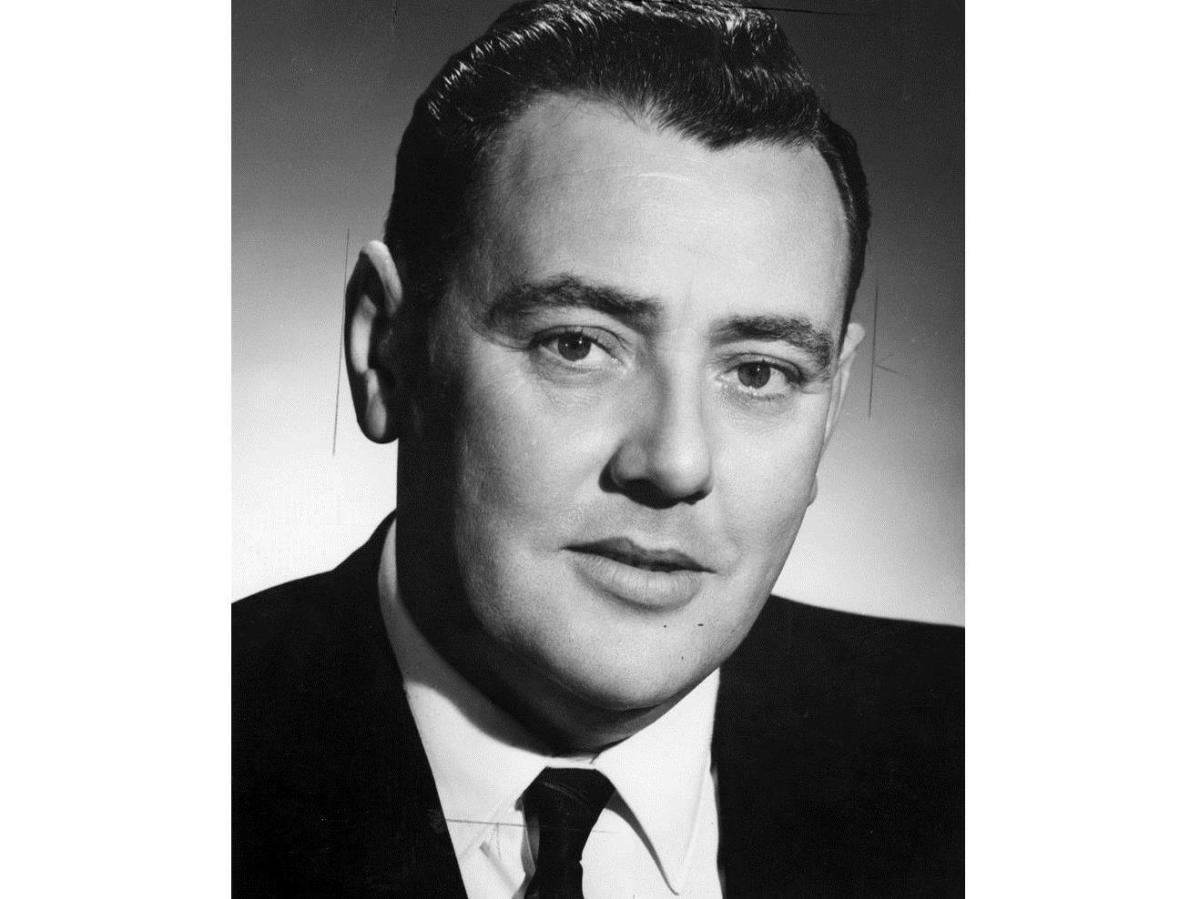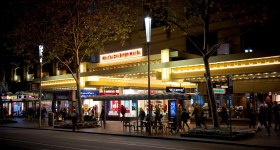Nigel Dick in 1968.
Nigel Dick, who was a key media executive at the dawn of television in Australia, passed away peacefully on the morning of March 8. In our globalised, digitalised, disintegrated age, how will we remember him?
Some will regard his service of more than 60 years with media companies, here and overseas, as his significant achievement, but his first challenge was coping with the disruption of his family. His earliest years were spent in India where his father was manager of a steel works. At six, his family returned to England, where his father suffered two heart attacks, the second fatal. He also lost his younger sister, his older brother have died earlier.
In 1940, at age 12, he was sent to Australia alone to escape the German aerial bombardment of southern England. His convoy was attacked by German U boats but he safely fetched up with relatives in Murwillumbah, on the NSW–Queensland border. There he matriculated and, initially, took up veterinary studies at the University of Sydney.
And in Murwillumbah he had his first taste of broadcast media and of management, doing a regular boy scouting segment on radio 2MW, and rising to the rank of lieutenant in the school’s cadet corp.
But being a vet was not for him: by 1948, he was working the sales department of the growing Packer empire, a company that straddled radio and print. In that earlier time of media disruption, as the new television licenses were granted in 1956, he became the first sales manager of GTV 9 in Melbourne. By 1960 he was the chief executive before taking over at TCN 9 in Sydney, a stepping stone to becoming a chairman of HSV 7 and Southern Cross Communications. Nigel was probably the last living executive to have worked with Sir Frank Packer, father to Clive and Kerry and grandfather of James. He later opposed, unsuccessfully, Kerry Packer’s push for the 1990s aggregation of regional licence.
And there was his work as a chair of the Broadcasting Corporation of New Zealand, his role as Federal Councillor of the Federation of Australian Commercial Television Stations (now Free TV Australia), a director of and consultant to Crawford Productions Pty Ltd. and deputy chairman and founding board member of the Victorian Film Corporation (now Film Victoria).
Certainly it was an illustrious and influential career in Australian and overseas media enterprises, and was recognised when he was made a Member of the Order of Australia in 1994 for Services to media, in particular ‘television, and the community’.
Nigel also served for many years on the board of the Royal Automobile Club of Victoria and was its president from 1993 to 1996.
But more enduring will be two other achievements.
The first was founding Odyssey House Victoria, the drug rehabilitation service.
In 1978, Nigel discovered that one of his sons was a heroin addict. Treatment and rehabilitation programs were in their infancy in Victoria but he visited Odyssey House in New South Wales, itself inspired by Odyssey House, New York that opened in 1966. Nigel determined to open a similar institution in Victoria.
He recruited some of the state’s and nation’s eminent citizens – a TV executive has access – including golfer Peter Thomson, businessman Sir Rod Carnegie, socialite Lilian Frank, and businessman and philanthropist Baillieu Myer and together approached the Victorian Premier Dick Hamer seeking financial support. In July 1980, Odyssey House Victoria’s Residential Rehabilitation program opened. Nigel served as founding chairman and board member for 35 years. When he stepped down, his daughter, Deborah, a psychiatric nurse, took over.
Odyssey House Victoria has changed the lives of many, and its services, residential and non-residential, extend to other addictions and to financial counselling. In 2017, it helped over 8,000 people take control of their lives.
The second is that Nigel, rather than write a tell-all memoir, submitted his experiences in television to academic examination. After retiring, he wrote a master’s thesis, as a student at RMIT University where he would also deliver annual guest lectures. RMIT subsequently awarded Nigel a PhD, honoris causa. But Nigel was never happy to accept that which he felt he did not fully earn, so set about to earn the degree of PhD, which he did in August 2015 at the age of 87.
He explained his purpose thus:
Many academics have written about television and interest in the medium has grown over the years. Media has been my lifetime career: newspapers, women’s magazines and, finally, but since its very beginning, television. My Master’s thesis, completed in 1999, was very much a personal view of the early days. Its central focus was that of a television executive writing about his experiences, rather than a scholar reaching out to university library shelves to seek the opinions of the academy.
This thesis argues that governments have issued too many licences for the available revenue in Australia. This has had the effect of lowering the number of quality Australian programs that could otherwise have been produced.
And a bit later…
In the United States the number of stations in each market was determined by the size of each market. In the United Kingdom, with a population, in the 1960s, five times greater than Australia, only one commercial station operated at any one time regardless of market size. Yet in Australia two commercial licences were awarded in the four eastern state capital cities prior to 1960 and all to newspaper companies. Within a few years, bowing to pressure from those keen to create a buyers’ market for advertising, the Australian Government granted third licences. Arguably a broadcasting policy would have provided a benchmark that determined whether or not there would be sufficient revenue to finance the program mix as set out in the agreed policy.
Yet this was not to be and, after 55 years of television, broadcasting policy is non-existent. This thesis examines each stage of commercial television’s evolution and argues that successive Australian governments have paid scant regard to the services that commercial television could have offered the viewing public.
So began what is Nigel Dick’s lasting contribution to understanding the culture and politics of Australian media industries, especially broadcast television. In 2011, he gave the Hector Crawford address at the annual SPAA conference. Despite his scepticism about the political management of television in Australia, he remained committed to television and screen production in Australia.
He recognised that in today’s digital environment networks can longer be protected by the limitations on the capacity of the spectrum. With the collapse of station brand loyalty, he argued, brand loyalty belonged to programs, and that could be used create an Australian brand image overseas for the whole screen production industry.
This is how Screen Hub reported his ideas of an Australian overseas sales initiative:
Locally and internationally, all quality Australia programs can gain market advantage by being branded ‘Australian’, he believes.
So it’s time that the independent television production sector engaged in a little self-interested cooperation. Nigel acknowledges that the proposal is just the framework of an idea, not a fully fleshed-out one. He advocates the creation of a private sector production co-op, funded out of a share of television license fees, perhaps the fraction that Senator Conroy is handing back to the licensees without any conditions attached.
There is no doubt that Australian content is popular. The Screen Australia report shows four of the five top-rating programs are Australia. The co-op would fully fund the production of quality Australian programs, documentary, reality, and drama program, in fact any kind of enacted program, selected by a creative assessment teams who would favour projects with marketability across a wide variety of platforms.
Programs invested in by the co-op would be branded front and back as programs as coming from, say, ‘The Australian Network’.
The structure of sales by the co-op to broadcasters would be hugely flexible. Exclusivity to a network across delivery platforms would come at a considerable premium, while sales across a variety of platforms, even rival platforms would be the norm. Importantly, sale prices would reflect the needs of the operators of different platforms, be they free-to-air, pay, streaming on line or on-demand, maximising returns by maximising turnover.
In time, Nigel thinks the co-op must become self-funding as he believes subsidy best serves mediocrity, and there’s no money in mediocrity. And as a private enterprise, supported only by kick-start government finance, it should not breach the onerous restriction imposed by the US-Australia FTA on Australian content quotas.
Perhaps the industry might revisit Nigel’s ideas, and add another leg to his legacy.
—
This obituary has been updated using information learned at the memorial service for Nigel Dick held on March 15, 2018, his 90 birthday. The service was presided over by Bishop Alison Taylor, formerly the Bishop for the Southern Region in Queensland, and conducted by the Reverend Roberta Hamilton, vicar of St Dunstan’s Anglican Church, Camberwell. Nigel was ahead of his time in many personal ways as well.
—–
Dr Vincent O’Donnell was a friend and academic colleague of Dr Nigel Dick and shared a love of media policy and its history.
There is a lovely photograph of Nigel at the age of 87 in his PhD robes, with his cane.
We carried his 2011 Hector Crawford speech to SPAA.





